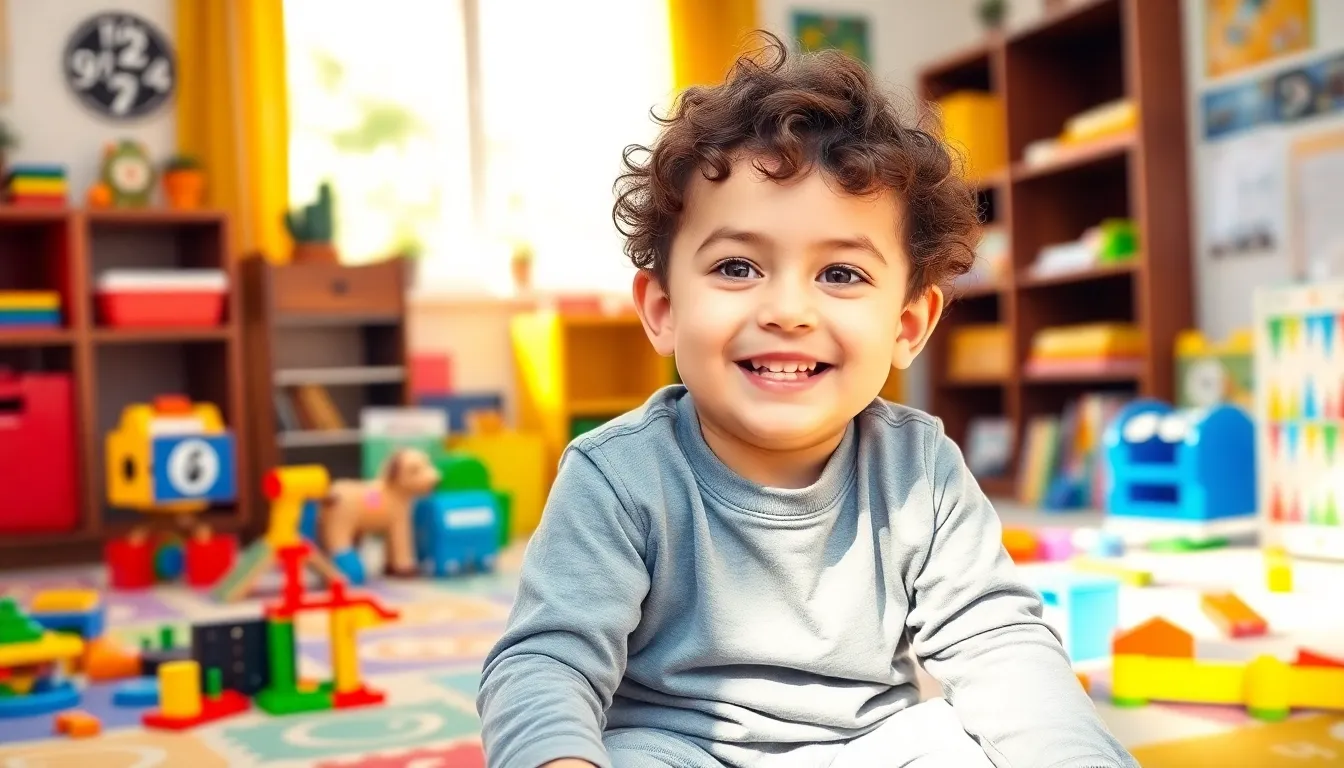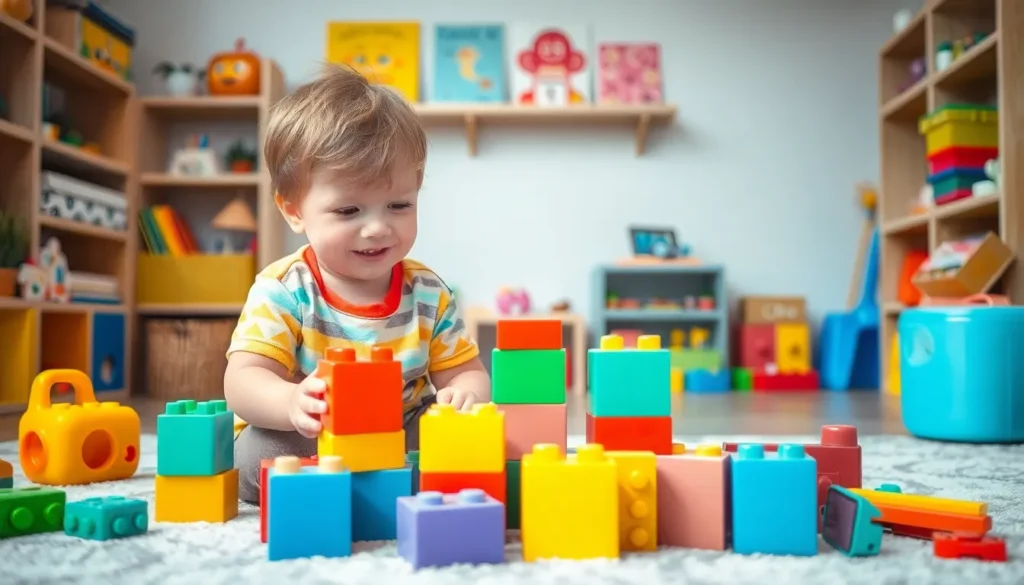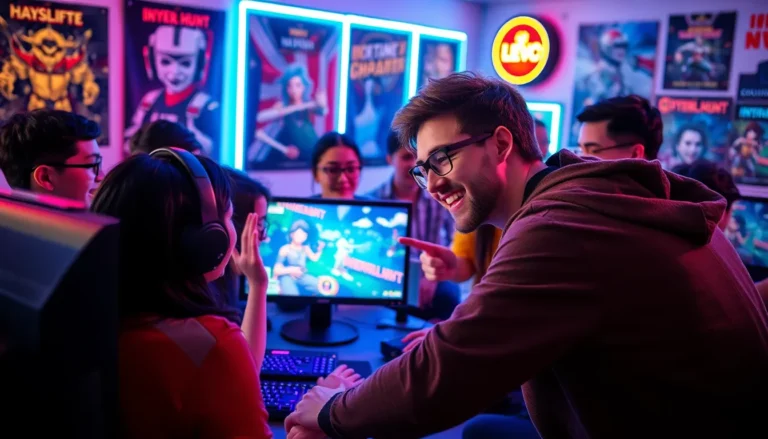Table of Contents
ToggleWhen it comes to preschoolers, learning can be as fun as a roller coaster ride—if you choose the right toys. Forget the boring worksheets; kids thrive on play, and the right learning toys can turn any living room into a mini classroom. These magical creations don’t just entertain; they spark curiosity and creativity, making education feel like an adventure rather than a chore.
Overview Of Learning Toys For Preschoolers
Learning toys for preschoolers play an essential role in cognitive and social development. These toys encourage exploration and creativity, turning playtime into invaluable learning moments. Types of learning toys include building sets, musical instruments, art supplies, and interactive games. Each category serves a specific purpose, targeting key skills such as problem-solving, fine motor skills, and language acquisition.
Building sets foster spatial awareness and critical thinking. Children construct various structures while experimenting with balance and stability. Musical instruments enhance auditory skills and introduce rhythm, promoting early language development. Art supplies invite self-expression and creativity, allowing preschoolers to explore colors, shapes, and textures.
Interactive games engage children with educational content while promoting cooperation and teamwork. Board games often require counting or strategy, helping to develop math and reasoning skills. Puzzles strengthen problem-solving abilities and enhance hand-eye coordination through hands-on play.
Age-appropriate toys ensure that challenges match a child’s developmental stage. Toys designed for young children focus on simple concepts, while those suited for older preschoolers introduce more complex ideas. This thoughtful selection helps sustain engagement and enthusiasm for learning.
Parents and educators must assess toys for safety, durability, and educational value. High-quality materials minimize risks, ensuring a safe play environment. The right choice in learning toys transforms any space into a learning hub, supporting a child’s imagination and curiosity effectively. Engaging in play with these toys promises to create a positive foundation for lifelong learning experiences.
Types Of Learning Toys

Learning toys encompass a variety of tools designed to support preschoolers’ development. Each type offers unique benefits that cater to different skills.
Educational Games
Educational games provide an engaging way for children to learn essential concepts. These games often focus on skills like counting, reading, and problem-solving. They promote critical thinking through interactive challenges. Many educational games encourage cooperation, allowing children to play and learn with peers. These games often incorporate bright colors and characters to captivate kids’ attention. They can range from digital apps to traditional board games, ensuring diverse learning experiences.
Building Blocks
Building blocks foster creativity and spatial awareness in preschoolers. These toys allow children to experiment with balance and structure, developing fine motor skills. Various sets include different shapes, colors, and sizes, creating opportunities for imaginative play. From simple towers to complex structures, the possibilities are endless. Children often enjoy collaborative play, sharing ideas and creating together. Building block sets encourage logical thinking and problem-solving, reinforcing foundational skills through hands-on experience.
STEM Toys
STEM toys play a critical role in introducing science, technology, engineering, and math concepts. These toys stimulate curiosity and encourage children to explore their environment. Many STEM toys include components that promote experimentation, like robotics kits and science kits. Engaging with these toys often leads to the development of analytical skills. Preschoolers can enjoy hands-on activities that spark interest in future learning. STEM toys also create a fun way to explore concepts through coding, building, and testing, making education feel interactive and enjoyable.
Benefits Of Learning Toys
Learning toys provide numerous advantages for preschoolers. They enrich a child’s playtime, offering both enjoyment and educational value.
Cognitive Development
Cognitive growth thrives through playtime engagement. Learning toys, such as puzzles and building blocks, sharpen problem-solving abilities. Children enhance their memory and attention spans while exploring various concepts. Skills like critical thinking receive a boost as kids figure out how to navigate challenges presented by these toys. Notably, STEM toys introduce complex ideas in fun, accessible ways. These toys encourage curious minds to ask questions, fostering a love for learning in early childhood. Children develop essential skills, such as logic and reasoning, which set the stage for future academic success.
Social Skills Improvement
Social interactions flourish with the right learning toys. Toys that promote teamwork, like cooperative board games or construction sets, encourage children to collaborate. Sharing and taking turns become second nature, reinforcing important social norms. Kids learn about empathy and communication through role-play scenarios. By participating in group activities, they develop conflict resolution strategies. Interactive play nurtures relationships, helping children forge connections with peers. Positive social experiences prepare them for future teamwork in school settings and beyond. Ultimately, learning toys play a vital role in shaping social competence in preschoolers.
Selecting The Right Learning Toys
Choosing suitable learning toys sets the stage for productive play. Each toy should align with a child’s developmental stage, enhancing rather than hindering their growth.
Age Appropriateness
Selecting age-appropriate toys supports effective learning. Toys designed for specific age ranges ensure that challenges match a child’s skills. For instance, toddlers benefit from simple stacking blocks that enhance motor skills. Preschoolers thrive with puzzles that encourage reasoning and problem-solving. Toys exceeding a child’s skill level can lead to frustration, while those that are too easy may lack engagement. Encouraging exploration should be the primary goal. Always check the manufacturer’s age recommendations to select toys that foster curiosity and creativity.
Safety Considerations
Ensuring toy safety is paramount for young children. Look for toys made from non-toxic materials that withstand wear and tear. Sharp edges or small parts pose risks, so select items free of such hazards. A thorough inspection of labels provides insight into safety standards. Selecting toys that meet safety certification ensures high standards for durability and non-toxicity. Additionally, regular checks for wear will maintain safety during playtime. Prioritizing safety creates a secure environment where children can play freely while learning.
Popular Learning Toys For Preschoolers
Preschoolers thrive with engaging learning toys that promote development. Building sets captivate young minds as they encourage spatial awareness and problem-solving skills. Puzzles offer a fun way to enhance critical thinking while improving fine motor skills.
Musical instruments inspire creativity by fostering auditory skills. Options like tambourines, xylophones, and ukuleles provide enjoyable ways for children to explore sounds and rhythms. Art supplies also encourage self-expression, allowing kids to experiment with colors and shapes.
Interactive games attract attention because they promote cooperative play. Board games, for example, teach teamwork and strategy while developing math and reasoning skills. These games often encourage social interaction, making learning a shared experience.
STEM kits constitute another popular toy category, introducing preschoolers to foundational concepts in science, technology, engineering, and math. Kids can experiment with hands-on projects that spark curiosity and inspire future learning.
Books offer another vital tool for language development. Age-appropriate stories enhance vocabulary and comprehension by engaging children’s imaginations. Reading together not only fosters a love for literacy but also strengthens parent-child bonds.
Selecting toys designed specifically for children’s developmental stages proves essential for maintaining engagement. Safety and durability should always take priority. Toys crafted from non-toxic materials ensure a worry-free play environment, allowing children to explore freely. Regular inspections and adherence to safety standards guarantee a secure location for exciting educational adventures.
Choosing the right learning toys for preschoolers is essential for fostering a love of learning. These toys not only stimulate curiosity and creativity but also lay the groundwork for essential skills that will benefit children throughout their lives. By selecting age-appropriate and safe options, parents and educators can create an enriching play environment that promotes exploration and development.
Investing in high-quality learning toys turns everyday play into meaningful educational experiences. As children engage with building sets, puzzles, and interactive games, they embark on exciting adventures that enhance their cognitive and social abilities. With the right tools at their fingertips, preschoolers are well-equipped to thrive in their educational journeys.




